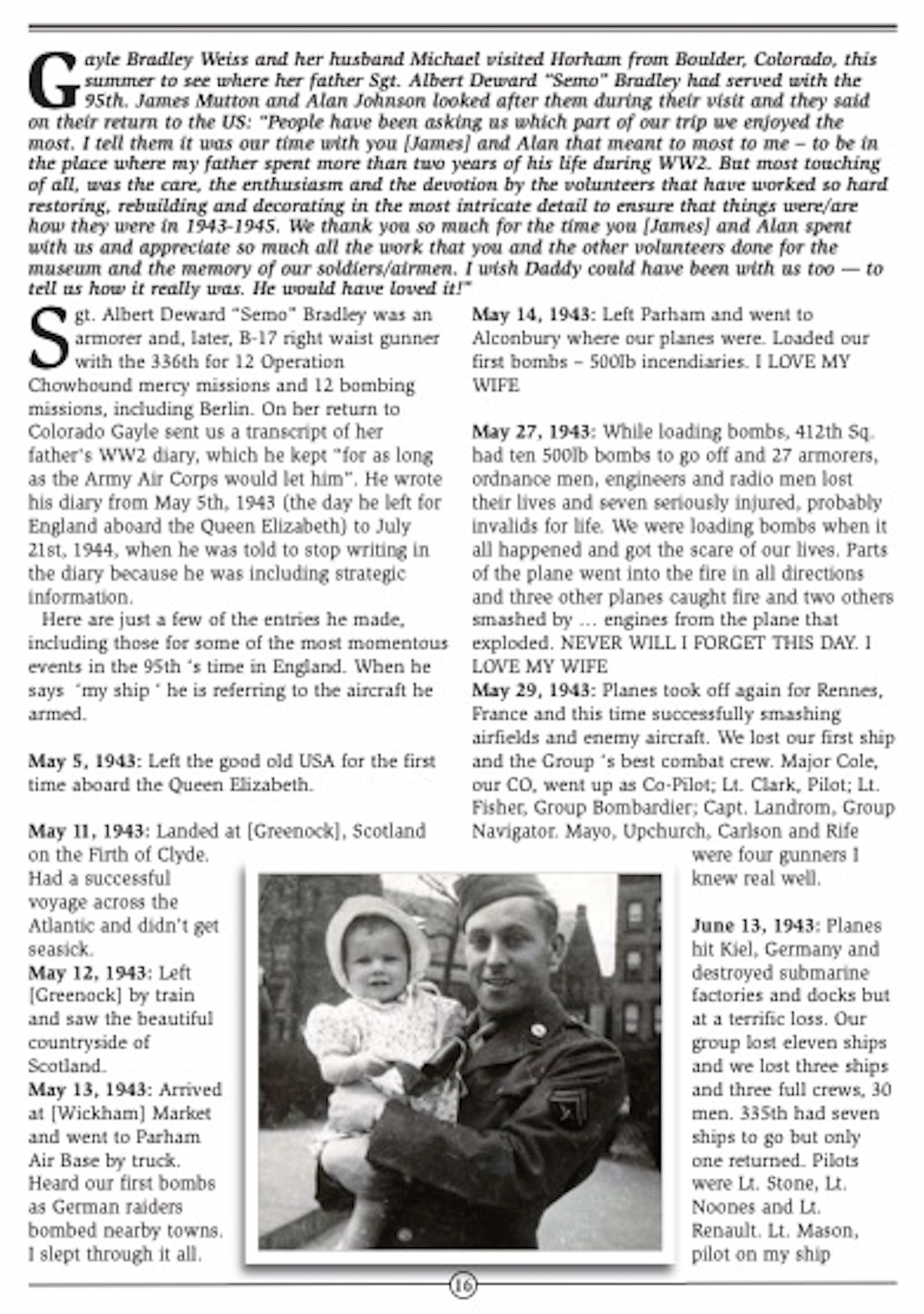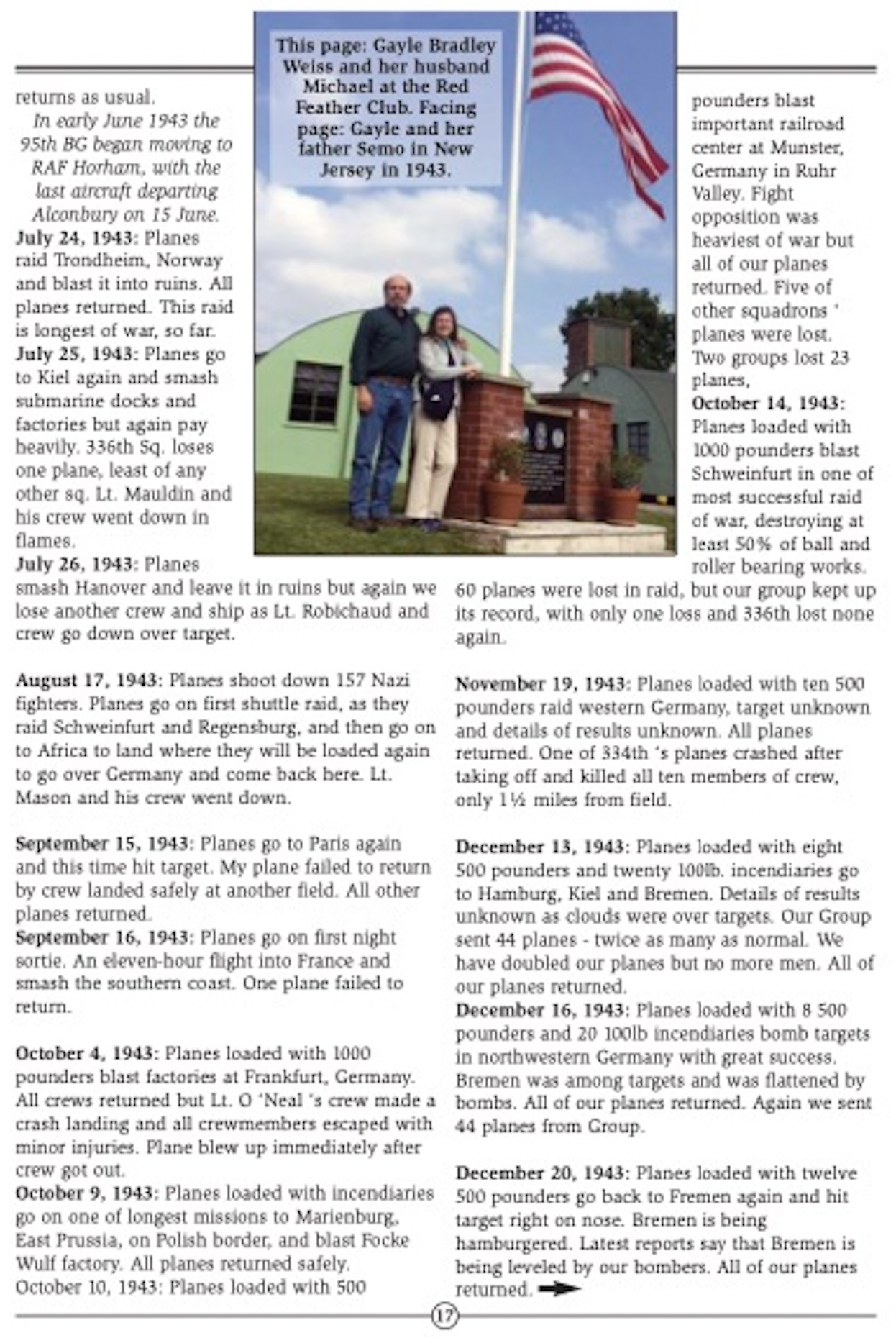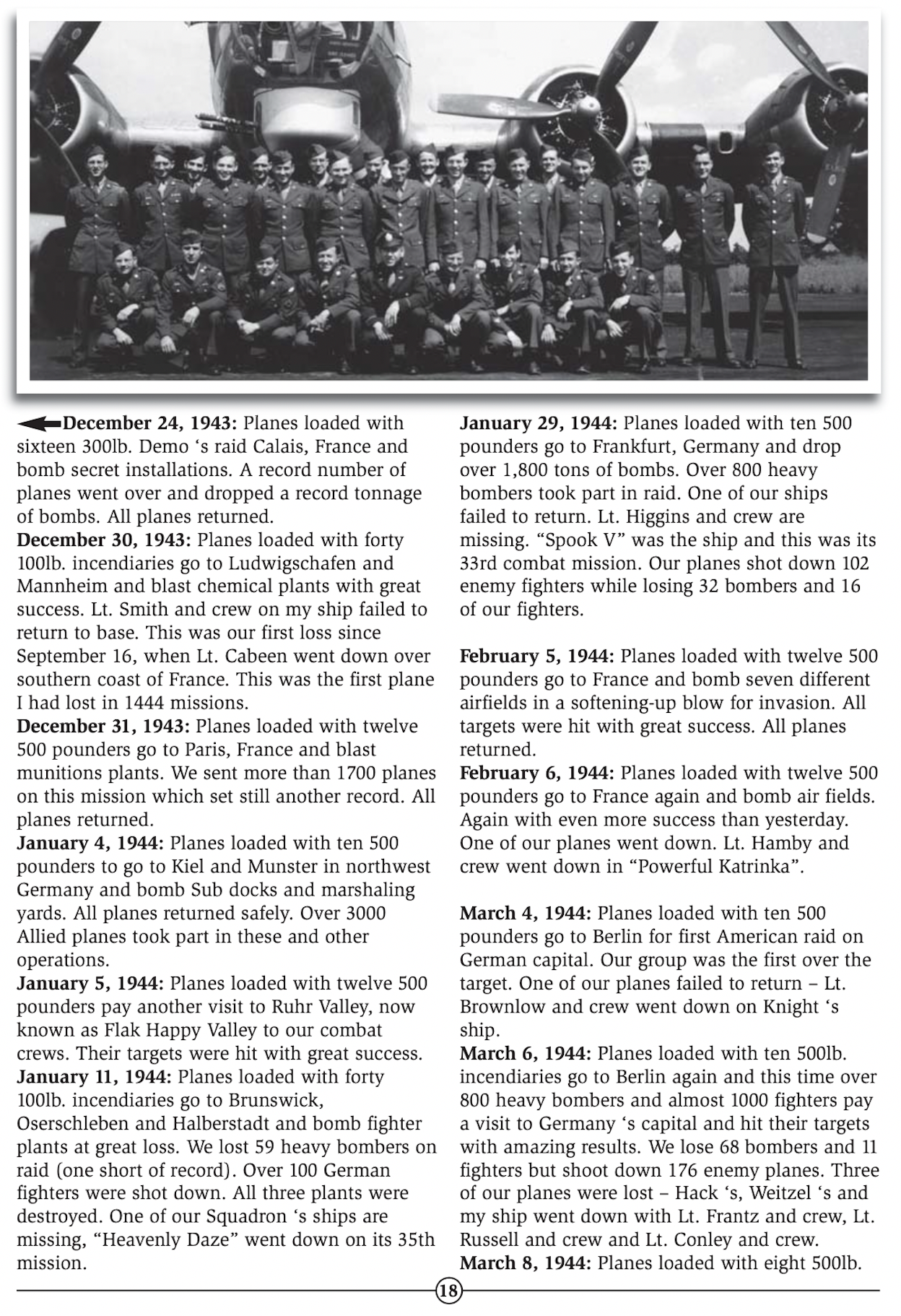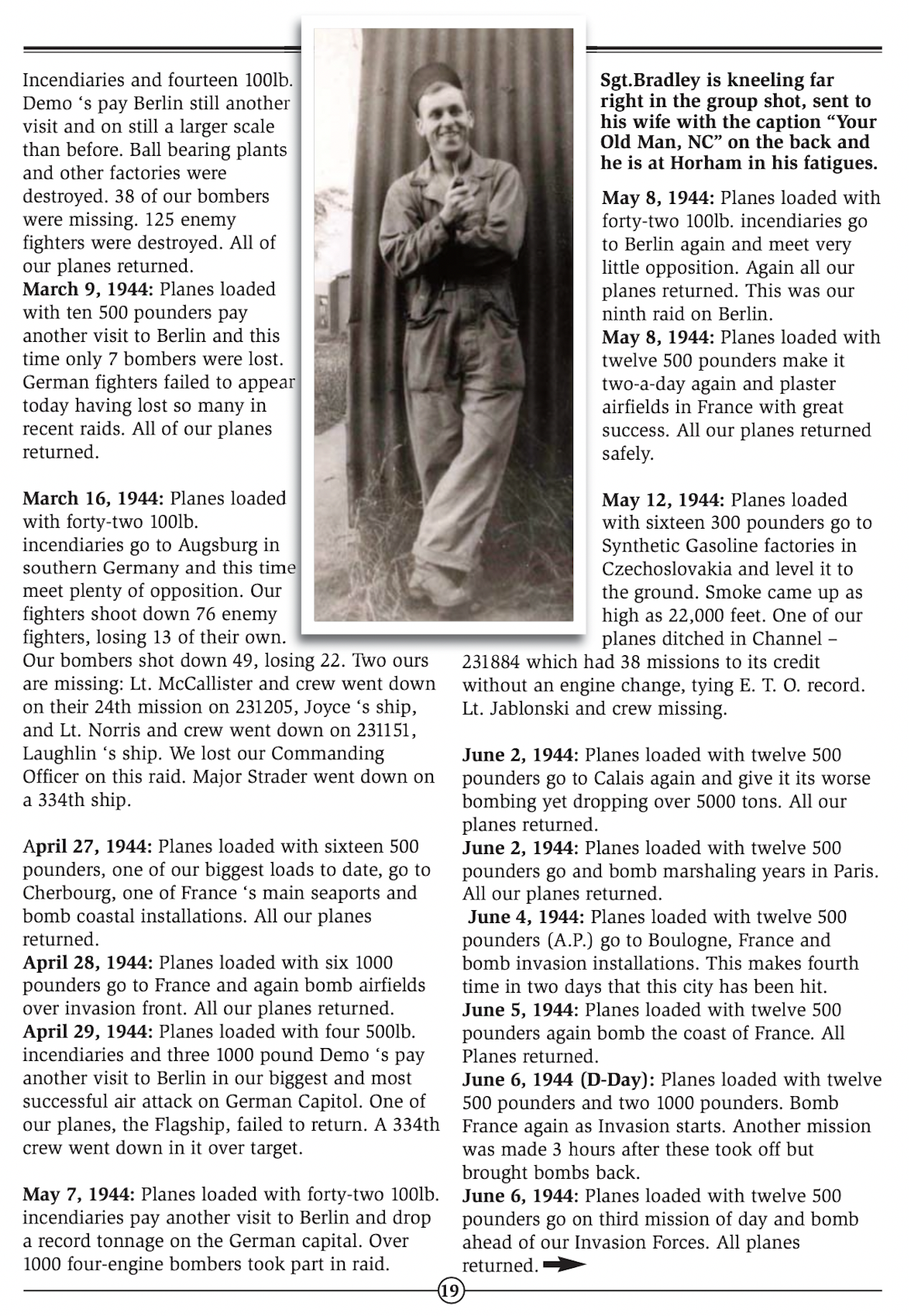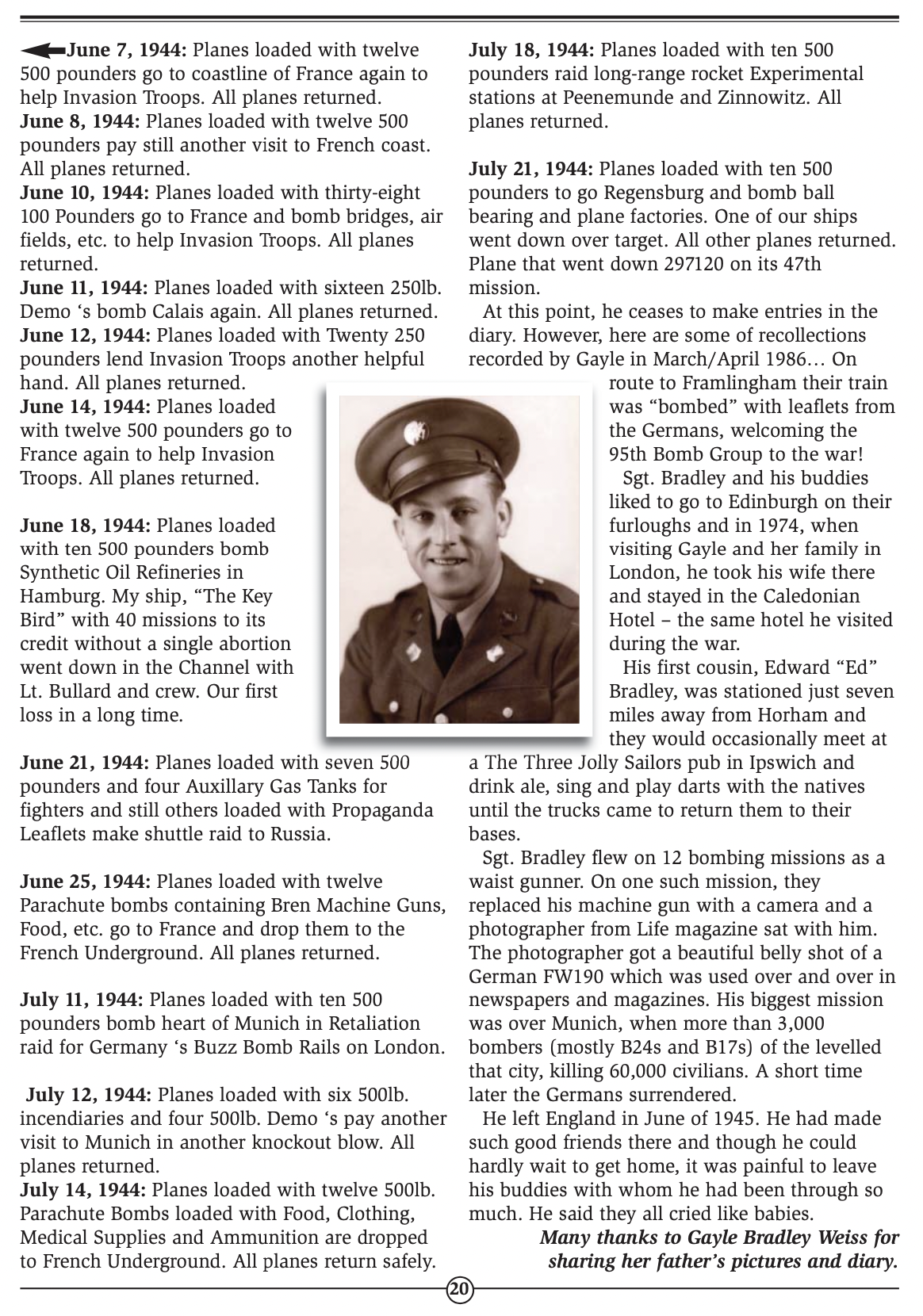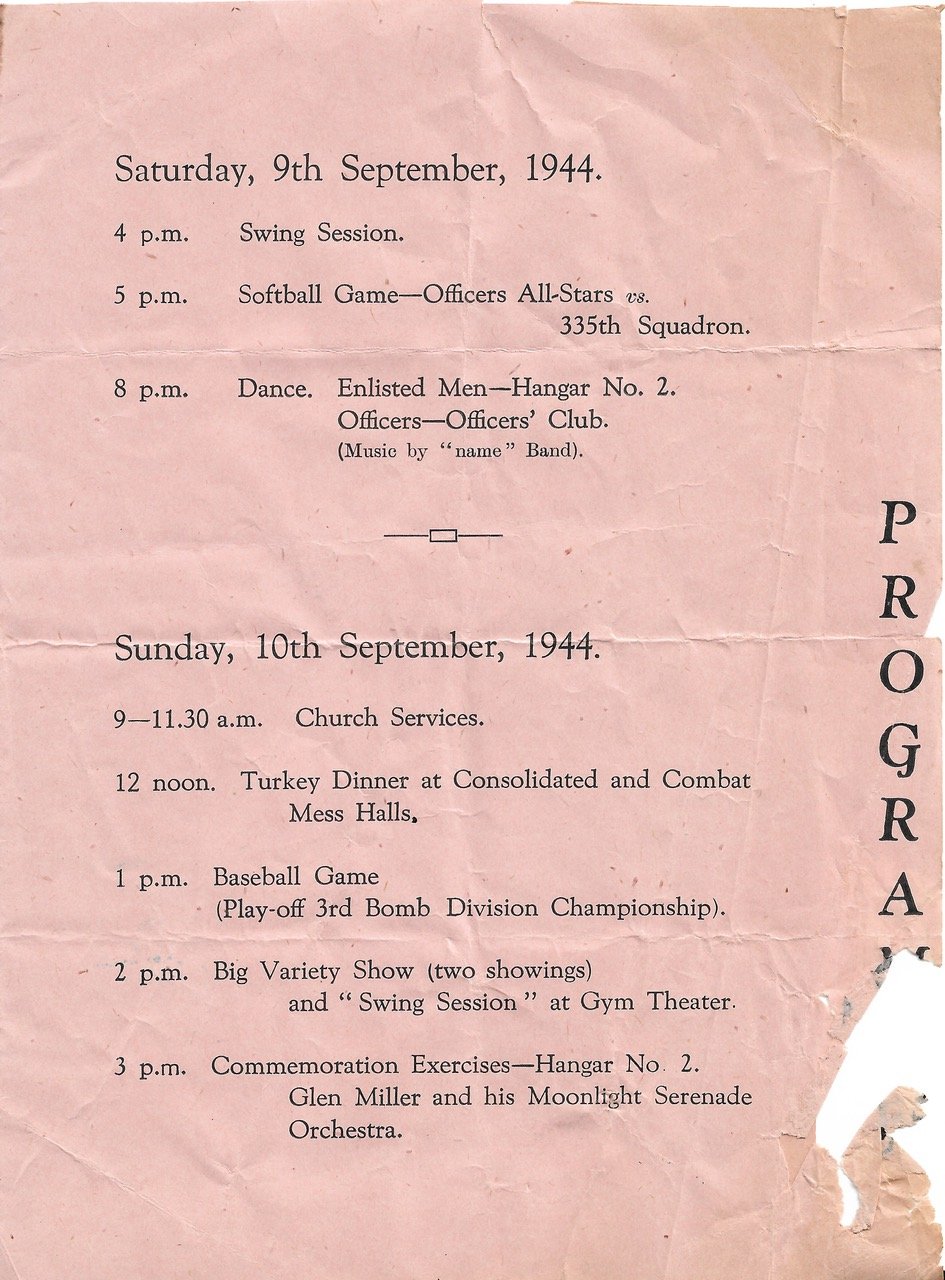Albert D. "Semo" Bradley
Albert “Semo” Bradley
Wilson, NC
by Gayle Bradley Weiss
Three of the four Bradley boys entered the service during the Second World War: Semo, Cecil and Ernest. Woodrow was turned down because he had stomach ulcers -- quite a relief for Mildred to have at least one of her sons at home. Semo had been the first to go in August 1942. After discovering from his foster father-in-law, Lawrence Trevathan, who was a Captain in the Army Corps of Engineers (WWI), that he was up for the draft in October, he took Lawrence's advice and enlisted in the Army/Air Corps. By enlisting, he could choose what training he would receive. He did not want to be in the infantry! And so he was inducted on August 29, 1942, at the age of 27, with three other "Wilson boys". I was five months old. His basic training was held on the golf courses of Miami Beach and their barracks, in one of the luxury hotels. He spent four months at Buckley Field, Colorado, being trained in armament on fighter planes. But then he was assigned to a bomber unit and had to be trained all over again. Isn't that just like the government?! On his way to Geiger Field, Washington (near Spokane) where they were to receive this new training, they had a lay-over in Salt Lake City, where they had a chance to see Tommy Dorsey's orchestra along with his famous new singer, Frank Sinatra! After four months at Geiger Field, they were transferred to Rapid City, South Dakota, where blizzard conditions existed much of the time he was there. Mama was able to visit him there for a week, traveling across country by train. Then, in the Spring of 1943, on to Camp Kilmer, NJ, where he waited to be shipped overseas. In April, Mildred, Pop, Mama and I (now a year old) were able to visit Daddy in Newark for a few hours -- he had to meet us at a hotel (the Essex House) so that we wouldn't know where he was stationed. After returning home, Mama was so lonesome for Daddy that she talked his sister Virginia into going back up there with her to try and find him. They took the train and by listening to soldiers talk, deduced that Daddy would have to be at one of two bases in the Newark area -- Fort Dix or Camp Kilmer. So they decided to try Camp Kilmer first, took a bus to the main gate and were told that they could not enter. Not knowing what else to do, they hung around until a unit of soldiers came marching by. Well, Mama and Virginia got into the middle of those soldiers and marched along with them right through the gate! Just like in the movies – can’t you just see Lucy Ricardo and Ethel Mertz doing just that?! The soldier next to Mama asked where she wanted to go. And, as luck would have it, they were going to march right by Daddy's barracks. He told them to "fall out" when he gave the signal. Once inside the barracks, Mama recognized one of the soldiers that she had met in South Dakota and he told her that Semo was on K.P. duty. He went and relieved Daddy and the three of them went to an Orderly Room and sat at a table and were talking when a Major appeared a short time later. Needless to say, he wasn't very happy and personally escorted Mama and Virginia to the gate! "We were brave girls", Mama said. They went back to their boarding house room (in an attic) and waited patiently for two days for Daddy to get a chance to call. While they were waiting, Virginia remembers eating at a restaurant and ordering roasted chicken. Trying to have good manners (she was used to eating chicken with her fingers), she tried cutting it with a knife and it went flying off the plate onto the floor. On the third day, they received a phone call from John Graves of Wilson who was also stationed at Camp Kilmer. He told Mama, "Elizabeth, all I can tell you is to go home" -- meaning that Daddy had already been shipped out. This same John Graves, who worked in supplies, made sure that Daddy had extra fatigues, underwear, blankets, and C-Rations before he went overseas. In May of 1943, Semo was assigned to the 95th Bomb Group and transported to England aboard the "Queen Elizabeth" along with 23,000 other GI's. It was so crowded that Daddy had to sleep above a doorway and didn't get a bunk until about half of the troops were dropped off at a base on the Firth of Clyde, on the coast of Scotland. After landing at Glasgow, Scotland, the rest were hauled by troop train to Framlingham, England and while on route their train was "bombed" with leaflets from the Germans, welcoming the 95th Bomb Group (8th Air Force) to the war! All that secrecy for nothing! After two weeks in Framlingham (the RAF was building a new B-17 airfield at Horham but it was not quite finished), his group was transferred to the airfield at Horham, northeast of London, for the duration of the war in the European Theater -- the next 26 months. Daddy and his buddies liked to go to Edinburgh, Scotland on their furloughs. Daddy loved that city. In 1974, when visiting my family and me in London, he took Mama there and they stayed in the Caledonian Hotel -- the same hotel where Daddy had stayed during the war. At some point while in England, Daddy met up with his first cousin, Edward “Ed” Bradley of Raleigh, NC, son of his Uncle Paul, who was stationed just seven miles away. They would occasionally meet at a pub in Ipswich called "The Three Jolly Sailors" (it is no longer there) and drink ale, sing and play darts with the Brits until the trucks came to return them to their bases. It was really nice for him to have some family close by. Ed says that whenever Grandma and Pop would send Daddy a box of goodies from home, they would always send him one, too. Ed was raised by an aunt and uncle after his mother died and lost his father, Paul, in 1942 -- just two months after he had been inducted into the Army at age 21. Since that time especially, Pop seemed to feel a great responsibility for Ed. Pop had made several trips to Raleigh to visit his brother, Paul, after Paul's wife's death in 1933 to try to help him pick up the pieces but he was inconsolable. After that, Ed always visited "Aunt Mildred and Uncle Roland" in Wilson whenever he was home on leave. And after a teary farewell and hugs at the bus station, Ed would find some money tucked in his back pocket – put there by Pop. Daddy loaded bombers for most of his time spent in England, but near the end of the war, more men were needed to fly missions -- gunners and pilots -- so he volunteered to be a gunner on a B-17 bomber (Flying Fortress). He flew on twelve mercy missions to drop K-Rations during "Operation Chow Hound" to the Dutch after the Nazis opened the dikes. K-Rations were "good eating" -- containing ham, eggs and even chocolate bars! He also flew on twelve bombing missions as a right waist gunner. On one such mission, they replaced his machine gun with a camera and a photographer from Life magazine sat with him. The photographer got a beautiful shot of a FW190, a German pursuit plane -- Daddy says that he could have knocked that plane right out of the air had that camera not been there. The photographer had a heart attack two weeks later and died. He was 52 years old, but he left his mark -- that one photograph of the FW190 was used over and over in newspapers and magazines. Daddy's biggest mission was over Munich, when more than 3000 bombers (mostly B-24's and B-17's) of the Allied Forces leveled that city, killing 60,000 civilians. A short time later the Germans surrendered. Semo left England in June of 1945. He had made such good friends there and though he could hardly wait to get home, it was painful to leave his buddies with whom he had been through so much. He said they all cried like babies. He touched American soil at Bradley Field, Connecticut and the next day took a train to Fort Bragg, NC (the train went right through Wilson -- he recognized several people waiting at the station but couldn't get off the train.) The next day, Pop's birthday (June 26), he was on a bus for Wilson where he had a 30 day leave before going to "sweat out his discharge" in Arizona. Later, on the way to Arizona, during a 24-hour layover in Chicago, he and four buddies decided they wouldn't go to bed -- that they'd do the town instead. After Semo bought a 12-cent pack of cigarettes, they went to Duffy's Tavern and ordered fillet mignons and a round of Tom Collins. More rounds kept appearing until they had each had five drinks. When they got up to leave and pay their bill, the waiter said that it was all taken care of. Then they took a bus out to Wrigley Field for a baseball game between the Chicago Cubs and the Cincinnati Reds. Then it was back into the city to go to a theater where Benny Goodman was on stage. Then to a movie, then to a nightclub, and back to the base in time to catch the troop train. In that twenty-four hour period, they only spent 12 cents -- for Semo's cigarettes. The rest had been taken care of by patriotic, grateful citizens who appreciated what these boys were doing for their country. Semo never forgot that town -- they made him feel proud to be an American. He was on his way through New Mexico to the base in Arizona to receive training to fight in the Pacific when his train was stopped by civilians swarming the tracks. It was August 14, 1945 and they were celebrating V-J Day -- the war in the Pacific was over! Everybody was hugging and kissing the soldiers on the train -- showing their respect and gratitude, jumping and shouting for joy. A month later, Semo was honorably discharged as a sergeant on September 17, 1945, after three years and 19 days in the service. I was 3 and a half years old by then. Until he got home, apparently I would go up to anyone I saw in uniform and ask him if he was my Daddy – much to my mother’s embarrassment!!
Unfortunately, my Uncle Ernest didn’t make it home – he was KIA when the B-24 he was in ditched in the Pacific after pre-invasion action over Iwo Jima (24 Jan 1945) – Japanese Ack Ack detonated the bombs they were dropping prematurely under the belly of the plane (Ernest was the belly gunner) and he was wounded. The plane limped back to their base on Saipan but went into the ocean on its right wing when the damaged flaps didn’t work properly. Of the 11 crewmen on board, 8 survived. Uncle Ernest (only 19) and two others drowned and were washed ashore on nearby Tinian Island the next day. Such a sad time for the family. My grandmother (Mildred) grieved mightily until his body was brought back to Wilson three years later in 1948. My Uncle Cecil was in the Army Signal Corps, stationed in Hawaii and was on the way to Japan with the US invasion forces when Japan surrendered. He then served with the Occupation Forces in Japan for a year but can home safely in 1946. Mildred lived to be 98 years old (Oct. 1988), outliving Ernest; her husband Roland who died in 1961; Cecil, who died in 1985 and Semo (Daddy) who died in 1986. Only Woodrow and daughter, Virginia, survived her. And they are all gone now.
The following article appeared in the
95th Bomb Group Heritage Association’s Autumn 2016 newsletter:
Glen Miller Program – 200th mission party.
The actual performance was September 10, 1944
in Hanger # 2 after the 3pm Commemoration Exercises.
The following are recordings made in 1986 of “Semo” Bradley, armorer in the 336th Squadron. The first is about his trip across the Atlantic in May 1943 on the Queen Elizabeth, and the second are his memories of the Alconbury blast.
For vintage photos and missions list please see our searchable database.

